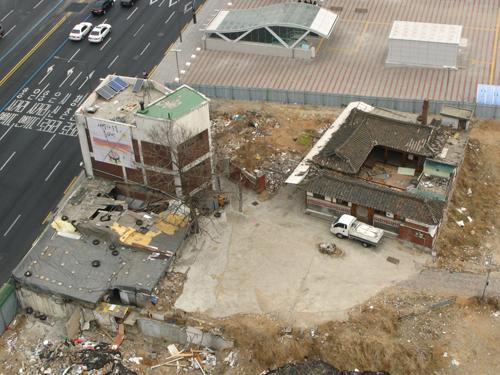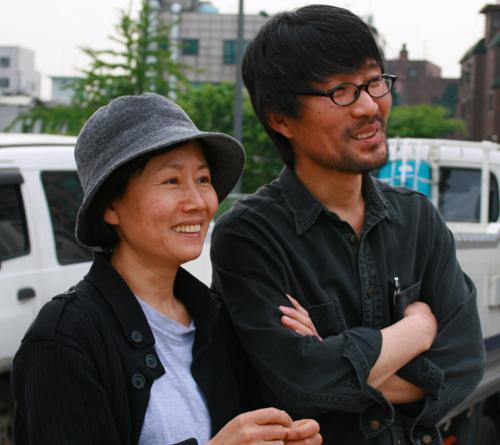공지사항
-
- '노란봉투'캠페인/국제연대..
- no chr.!
Since y'day you can find the following piece on the English main page of Yonhap news agency:
Former noodle restaurant Dooriban highlights legal loopholes letting down evictees
The South Korean capital, Seoul, has not mushroomed in population from a few hundred thousand to over 10 million in a little more than half a century without ongoing and dramatic changes being made to its cityscape.
But as the saying goes, what goes up must first be knocked down. Parks and mountains aside, Seoul's dense urban fabric is such that hardly any land, let alone a plot big enough for a sizeable building project, lies vacant. This occasionally causes protracted -- even violent -- conflicts.
Korea's most notorious case of redevelopment-related conflict reached a climax on Jan. 20, 2009, in Yongsan, central Seoul, when five evictee protesters and one policeman were killed in a fire that erupted during a violent clash.
The incident shocked Korean society to some extent, but has so far failed to prevent further stalemates of the kind from which it resulted.
One such situation is to be found at Dooriban, formerly a noodle restaurant next to Hongik University in western Seoul. It now stands as one of the only two remaining structures on an otherwise razed plot of land. The other is an empty traditional Korean hanok building (*), the demolition of which Dooriban's occupants have also struggled to prevent.

While GS Engineering & Construction, the current owner of the plot, waits for a chance to complete the demolition job and start building, Dooriban is holding out in protest at what, according to its owner, is a highly unjust eviction attempt that would effectively cast her out onto the street.
"We were offered three million won (US$2,700) in compensation," says Yoo Che-lim, the husband of Dooriban's owner Ahn Jong-nyeo. "Normally, the legal act that protects small business owners and tenants grants the right to do business for at least five years, but a subordinate clause states that this does not apply in areas designated for redevelopment."
Another law that entitles evicted small business owners to compensation for investments they have made in their own businesses also fails to apply to Dooriban, apparently because the scale of the redevelopment plot is too small.
Yoo quit his job at a publishing company in order to join the full-time occupation now in progress at Dooriban. "The law is wrong," he says. "It needs fixing. Applied as it currently is, it amounts to violence, not law."
Yoo likens the current legal struggles of evictees to those of early campaigners for the rights of women or black people, who also found themselves on the wrong side of existing laws at the time.
As of mid-May 2011, the Dooriban protest has been going on for one year and six months. After legal attempts by an alliance of local residents to secure adequate levels of compensation from GS E&C failed, Dooriban eventually remained as the only business to refuse subsequent increased cash offers from the construction giant.
The Dooriban owner, Ahn, is clear about her demands.
"Of course, I want the means to reopen Dooriban in this neighborhood, as well as compensation for lost Dooriban income, my husband's lost income since he quit his job, and compensation for our expenses in occupying this building in the mean time," she says.
When Dooriban's electricity supply was severed last summer, many of its occupants conducted a sit-in protest for a week at the headquarters of Mapo ward where it is located.

Dooriban owner Ahn Jong-nyeo and her husband Yoo Che-lim
"We claimed that it was the duty of the ward authorities to provide their citizens with commodities such as electricity," says Yoo. "The ward head said he would 'give us electricity.' He gave us a generator, but is not providing oil to run it."
An employee at Mapo ward's department of urban planning derides the notion that it is up to the ward to ensure that electricity is provided. "That's up to KEPCO (Korea Electric Power Corporation)," he says. "Anyone knows that."
"We hope the matter is resolved harmoniously," says a more senior employee from the same department.
With regard to Ahn's hope that Mapo ward will provide an opportunity for Dooriban to sit down and talk with GS E&C, he says the ward would have no objections if both sides requested the use of space in its headquarters to engage in dialogue.
Mapo ward declines to explain why it provided the generator.
Negotiations with GS E&C have been complicated by the fact that the construction company has allegedly subcontracted another enterprise, named Samojin, to complete the demolition job on the plot.
"Samojin has a bad reputation as the subcontractor that takes on the toughest demolition jobs and uses the most violence," says human rights activist Dopehead Zo, who currently spends much of his time supporting Dooriban by means including Internet broadcasts and Twitter.
"Samojin is working with GS E&C at a similar site at Dorim-dong in Yeongdeungpo ward," adds Zo. "A lot of illegal demolition and violence is going on there."
Having lost its gas supply and had most of its kitchen equipment forcibly removed, Dooriban no longer functions as a restaurant. It remains, however, busy with regular support concerts, talks, flea markets, film festivals and other events, and has become a symbolic hub of activism.
"We're under pressure but we're strong because lots of people are involved," says Yoo as he sits by the charcoal briquette stove on the first floor. "We're not arming ourselves or looking for a fight, but if Samojin approaches us with violence, we are prepared to resist."
"We use a lot of social media," says Zo. "If there is an immediate threat, we can send out a tweet," If this happens, Zo claims, a considerable number of people will arrive in around 20 minutes.
When contacted in early May, Samojin CEO Kim Bong-jung, expressed bemusement that Dooriban was receiving so much media attention when "there are so many other tenants in worse situations, they're just not intellectuals."
"We do our best to reach an agreement between the redevelopment association and the tenants. Every day that tenants resist, the members of the redevelopment association lose money. The tenants can stay there forever: it reaches a stage where we can't mediate any longer."
Kim claims an agreement was recently reached between Samojin and a committee formed of pastors, members of two progressive minor opposition parties -- the Democratic Labor Party and New Progressive Party -- and others representing Dooriban. "It should all be solved later this week or next week," he says.
Yoo is not so sure.
"In late April, we conveyed our demand, via the committee, to Samojin that it provide the means for Dooriban to reopen somewhere else in the local Hongdae area," he says. "At the time, Samojin agreed. But we haven't heard anything for more than three weeks, so we're not sure if they really meant it or whether they want to lull us into a false sense of security before attacking."
In the mean time, a group of activists is attempting to get a law passed that bans forcible eviction in such cases. As long as the law remains unchanged, however, Dooriban's status remains precarious and its struggle, with widespread local support, continues.
http://english.yonhapnews.co.kr/national/2011/05/16/34/0302000000AEN20110516001800315F.HTML
* Actually there's right now an independent art gallery inside.
Related report:
☞ Duriban - 500 Days of Struggle Against 'Reconstruction' (2011.5.08)
최근 덧글 목록